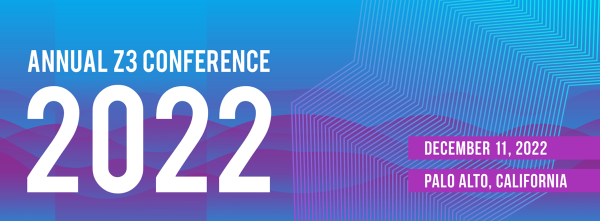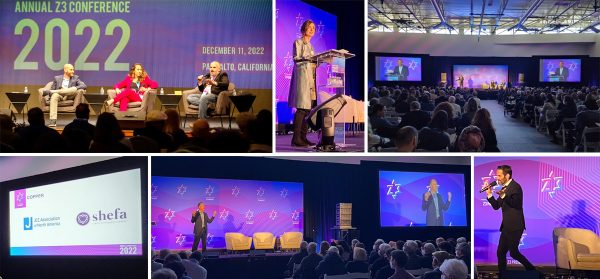By Doron Krakow
Unity, Not Uniformity
Something remarkable happened at the Oshman Family JCC (OFJCC) in Palo Alto, Calif., this past Sunday. Eight hundred people gathered to discuss, debate, and deliberate over the current state of relations between Israel and Jews living in the Diaspora—in particular, the North American Diaspora. Israel—the miraculous fulfillment of the modern Zionist movement founded by Theodor Herzl at the First Zionist Congress in Basle in 1897, soon to celebrate its 75th birthday—and the North American Diaspora, arguably the largest and most successful Diaspora Jewish community in the history of the world.
They came from across the San Francisco Bay Area and most of them weren’t members of the JCC and didn’t have any significant connection with our movement; but still they came, many not for the first time. For the better part of a decade, the OFJCC has played host to such gatherings each year—helping interested members of the community, from an array of perspectives and points of view, contend with the nuances and complexities of sometimes emotionally charged issues pertinent to Israel-Diaspora relations, like the JCPOA (the Obama era Iran nuclear deal), the territories, the Kotel Agreement, and who is a Jew. They’ve also pondered a host of dilemmas including: Who bears responsibility for what in the Jewish world, and what obligations do we have to and for one another?
Zack Bodner, the OFJCC’s remarkable CEO, refused to leave these topics unexplored, avoid them altogether, or allow myopia to prevail, as individual Jews hew to existing opinions and the carefully selected news sources that reinforce them. Instead, he embraced the JCC’s unique position as the Jewish community’s town square, bringing together divergent voices and perspectives both for a showcase and for conversation with the participants themselves. And so, the Z3 Project was born. The ground rules are simple enough: respectful and cordial discourse—irrespective of point of view; an invitation to be edified and to contribute to the edification of others; and a chance to embrace this unique moment in Jewish history in which we have achieved both sovereignty and extraordinary success here in North America.

That’s it.
Leading journalists, academics, artists, and politicians challenge one another’s assumptions and viewpoints, examining both obstacles and opportunities from different perspectives. On Sunday, Matan Kahana, until recently Israel’s Minister for Religious Affairs, reflected on the achievements of the short-lived Bennet-Lapid government and the implications of the impending inauguration of a new religious-right coalition under returning Prime Minister Benjamin Netanyahu. A panel of Gen Z’ers from both Israel and the U.S. offered insights into the issues that fire their imaginations and those that give them pause. Roya Harkakian, acclaimed author and academic, spoke about her perspective as an American and a first-generation Jewish immigrant from Iran. Comedians Guri Alfi and Tehran Von Ghasri, lightened the mood, allowing everyone on every side of the issues to laugh a bit—at the expense of all.

The large and diverse audience included philanthropists and community leaders from near and far. They too were honing in on perhaps the most compelling contextual element of this year’s gathering: It was taking place at the JCC—the most significant platform for Jewish engagement in more than 170 neighborhoods, towns, and cities from coast to coast. JCCs, the gathering places for the largest and most diverse representation of Jews of every age, background, disposition, and identity—and for whom one factor is particularly important: From the moment we pass through the doors, the things that bind us together as Jews are far more important than those that may set us apart.
And so, they came.
Z3 has returned in person following the disruption wrought by the pandemic, with most participants from beyond the OFJCC’s membership. For the third time, delegations of senior JCC executives from as far away as New Jersey, North Carolina, and Florida came to learn about how they might replicate the experience in their own communities, giving rise to additional Z3 events elsewhere on the continent. Major funders and supporters of the Bay Area JCCs and others interested in investing in greater Jewish community, Jewish peoplehood, and engagement with Israel also were there to observe and participate. Perhaps inspired by what they saw and heard, they, too, may be thinking about ways to do more.
Privileged to close this year’s Z3 conference, I delivered a simple message: We are living at the high point of Jewish history since the destruction of the Second Temple more than 100 generations ago. It is incumbent upon us to embrace our responsibilities to the memories of those generations and to make the most of our moment. We can best do that by recommitting ourselves to building upon our achievements and good fortune, boldly and ambitiously, to ensure that the generations that follow will be positioned to raise the bar further still. What’s more, it is incumbent upon every JCC to embrace our responsibility to be the place to which all members of our community—no matter their viewpoints—come to listen and learn; discuss and debate; confer and consider; without fear of acrimony or ostracization. Ultimately, that’s how we learn and grow—together.
Unity, not uniformity. Those may well be the watchwords of the Jewish people. Perhaps they’re also the essential wisdom of this moment—the brightest in two thousand years.
Shabbat shalom.

Doron Krakow
President and CEO
JCC Association of North America
 December 15, 1947: On this date, the last day of Hanukkah in the Hebrew year 5708, street skirmishes took place throughout Jerusalem as British-trained units of the Jordanian Arab Legion began what would become a total siege of the city and its increasingly isolated 100,000 Jews. By March 1948, the siege was complete, and in May, Jordan invaded and occupied east Jerusalem, dividing the city for the first time in its history and driving thousands of Jews into exile. And that’s the way it was…
December 15, 1947: On this date, the last day of Hanukkah in the Hebrew year 5708, street skirmishes took place throughout Jerusalem as British-trained units of the Jordanian Arab Legion began what would become a total siege of the city and its increasingly isolated 100,000 Jews. By March 1948, the siege was complete, and in May, Jordan invaded and occupied east Jerusalem, dividing the city for the first time in its history and driving thousands of Jews into exile. And that’s the way it was…
Reader Interactions